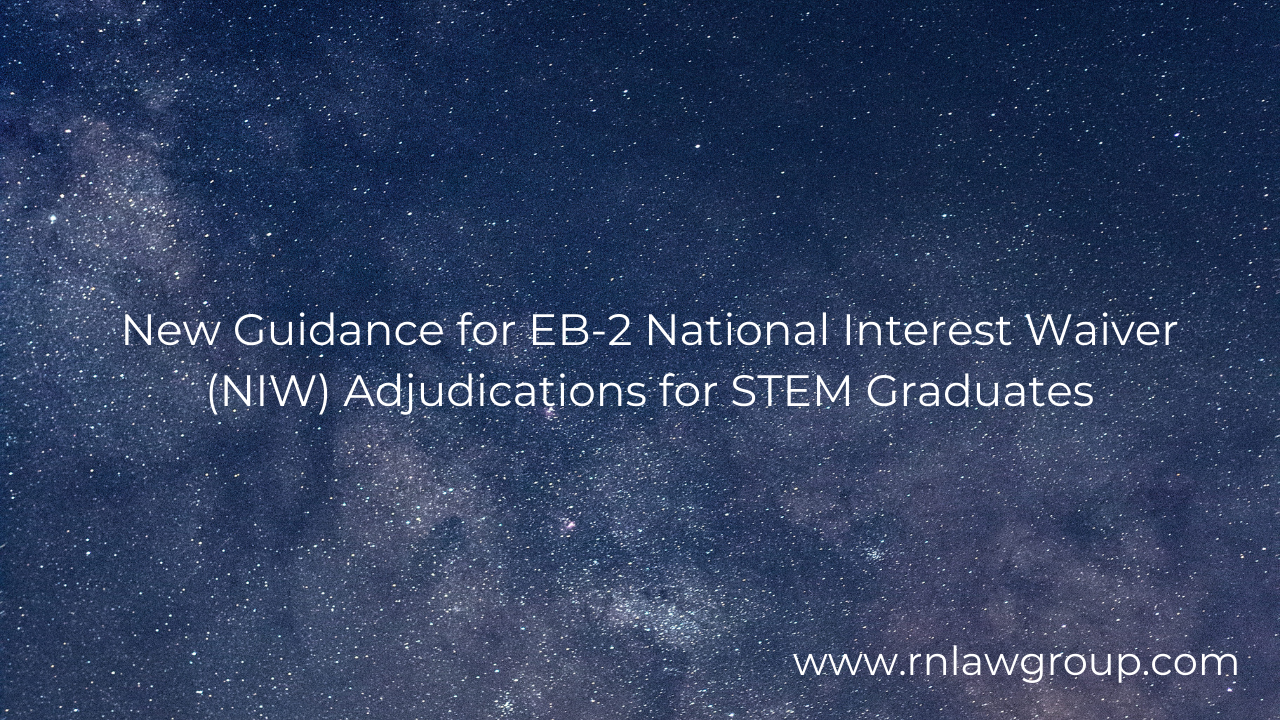
New Guidance For EB-2 National Interest Waiver (NIW) Adjudications for STEM Graduates
Normally, when an employer wants to sponsor an employee for the green card, the first step of the process is to obtain a labor certification from the U.S. Department of Labor. However, the labor certification process can sometimes be waived in the “national interest” of the U.S. in cases where the individual is a person of exceptional ability or a member of the profession with an advanced degree. The EB-2 National Interest Waiver (NIW) allows a foreign national to self-petition and file his/her own I-140, avoiding the PERM labor certification process and involvement of an employer.
On December 27, 2016, the Administrative Appeals Office (AAO) adopted a new framework for adjudicating the NIW in Matter of Dhanasar. This revision created greater clarity and flexibility for the broad discretionary waiver provision in order to benefit the United States. Under the AAO’s decision, qualification for the NIW requires the foreign national demonstrates by preponderance of the evidence that:
- The foreign national’s proposed endeavor has both substantial merit and national importance;
- The foreign national is well positioned to advance the proposed endeavor; and
- On balance, it would be beneficial to the United States to waive the requirements of a job offer and labor certification.
This new framework created a more inclusive balancing test for a broader range of potential scenarios, to be more flexible on application to a wide range of individuals in fields such as business, entrepreneurism, science, technology, culture, health, and education.
More recently, on January 21, 2022, USCIS provided clarifying guidance how the NIW can be used by STEM graduates and entrepreneurs. USCIS states that the updated guidance services to promote effective and efficient processing of benefits. The new guidance highlights the following:
- Explains adjudicatory framework for national interest waiver requests under Matter of Dhanasar,4 including special considerations for endeavors in STEM fields, as well as the significance of letters from governmental and quasi-governmental entities;
- Expands on the discussion in Matter of Dhanasar,5 to explain how the framework can apply to entrepreneurs; and
- Incorporates Matter of O-A, Inc., 6 explaining that USCIS considers the date of a provisional degree certificate for purposes of calculating post-baccalaureate experience.
Specific Evidentiary Considerations for Persons with Advanced Degrees in STEM Fields
The new guidance specifically states that USCIS recognizes the importance of STEM fields and the essential role of persons with advanced STEM degrees, especially in critical and emerging technologies and other areas important to U.S. competitiveness or national security. To identify a critical and emerging technology, USCIS officers will consider governmental, academic, and other authoritative and instructed sources, as well as all other evidence submitted by the petitioner. An example of an authoritative lists are lists of critical and emerging technology subfields published by the Executive Office of the President, by the National Science and Technology Council or the National Security Council. With respect to the first prong – the foreign national’s proposed endeavor has both substantial merit and national importance – the evidence must demonstrate that a STEM endeavor has both substantial merit and national importance. USCIS recognizes that many proposed endeavors that aim to advance STEM technologies and research, whether in academic or industry settings, not only have substantial merit in relation to U.S. science and technology interests, but also have sufficiently broad potential implications to demonstrate national importance.
Regarding the second prong – the foreign national is well positioned to advance the proposed endeavor – the individual’s education and skillset will be relevant to whether the individual is well-positioned to advance the endeavor. USCIS considers an advanced degree, particularly a Doctor of Philosophy (Ph.D.) in a STEM field tied to the proposed endeavor and related to work furthering a critical and emerging technology or other STEM areas important to U.S. competitiveness or national security, to be an especially “positive factor” to be considered for purposes of assessing eligibility under the second prong. USCIS states that a petitioner may submit any relevant evidence, including letters from interested government agencies (for example, a federally-funded research and development center), to show the person is well positioned to advance the proposed endeavor. However, it is important to note that a degree itself is not a basis to determine that a foreign national is well positioned to advance the proposed endeavor.
Finally, with respect to the third prong, USCIS considers the following combination of facts contained in the record to be a “strong positive factor:”
- The person possesses an advanced STEM degree, particularly a Ph.D.;
- The person will be engaged in work furthering a critical and emerging technology or other STEM area important to U.S. competitiveness; and
- The person is well positioned to advance the proposed STEM endeavor of national importance.
In addition, the evidence will be “especially weighty” and more value will be placed where the endeavor has the potential to support U.S. national security or enhance U.S. economic competitiveness, or when the petition is supported by letters from interested U.S. government agencies.
For more information on whether you qualify for the EB-2 NIW, consult with a Reddy Neumann Brown PC attorney.
